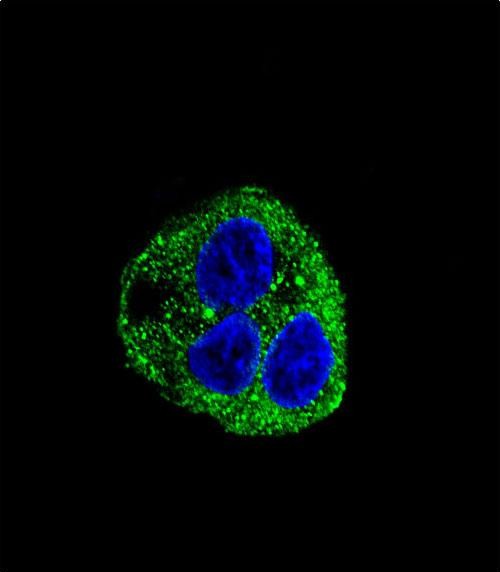

| WB | 咨询技术 | Human,Mouse,Rat |
| IF | 咨询技术 | Human,Mouse,Rat |
| IHC | 咨询技术 | Human,Mouse,Rat |
| ICC | 1/10-1/50 | Human,Mouse,Rat |
| FCM | 咨询技术 | Human,Mouse,Rat |
| Elisa | 咨询技术 | Human,Mouse,Rat |
| Aliases | Leptin, Obese protein, Obesity factor, LEP, OB, OBS |
| Entrez GeneID | 3952 |
| WB Predicted band size | 18.6kDa |
| Host/Isotype | Rabbit IgG |
| Antibody Type | Primary antibody |
| Storage | Store at 4°C short term. Aliquot and store at -20°C long term. Avoid freeze/thaw cycles. |
| Species Reactivity | Human |
| Immunogen | This Leptin (LEP) antibody is generated from rabbits immunized with a KLH conjugated synthetic peptide between 134-166 amino acids from the C-terminal region of human Leptin (LEP). |
| Formulation | Purified antibody in PBS with 0.05% sodium azide,1%BSA and 50% glycerol.prepared by Saturated Ammonium Sulfate (SAS) . |
+ +
以下是关于Leptin(LEP)抗体的3篇参考文献示例,包括文献名称、作者及简要摘要内容:
---
1. **"Positional cloning of the mouse obese gene and its human homologue"**
*Authors: Zhang, Y., Proenca, R., Maffei, M., Barone, M., Leopold, L., Friedman, J.M.*
**摘要**: 该研究首次克隆了小鼠和人类的肥胖基因(Leptin),并开发了特异性抗体用于检测Leptin蛋白在小鼠血浆和组织中的表达,验证了其与肥胖表型的相关性。
2. **"Antibodies to leptin antagonize its action in vivo"**
*Authors: Harris, R.B.S., Zhou, J., Redmann, S.M., et al.*
**摘要**: 通过注射多克隆Leptin抗体阻断小鼠体内Leptin的生物活性,证明抗体可抑制Leptin减少摄食和降低体重的功能,为研究Leptin信号通路提供了工具。
3. **"The stomach is a source of leptin"**
*Authors: Bado, A., Levasseur, S., Attoub, S., et al.*
**摘要**: 利用免疫组化技术和Leptin特异性抗体,首次发现胃黏膜细胞分泌Leptin,揭示了其在胃肠道中的局部生理作用。
4. **"Use of leptin monoclonal antibody to validate leptin receptor signaling"**
*Authors: Ogus, S., Ke, Y., Qiu, J., et al.*
**摘要**: 通过单克隆抗体阻断Leptin与受体的结合,验证了Leptin在细胞信号转导中的关键作用,并评估了抗体在体外实验(如Western blot)中的特异性。
---
以上文献涵盖了Leptin抗体的开发、功能验证及在生理研究中的应用,可作为相关实验设计的参考。具体引用时请核对期刊、年份及作者全名。
Leptin (LEP), a 16-kDa adipokine encoded by the *LEP* gene, is a hormone primarily secreted by adipose tissue to regulate energy homeostasis by suppressing appetite and promoting energy expenditure via hypothalamic signaling. It binds to leptin receptors (LEPR) in the brain, activating pathways that control satiety, metabolism, and neuroendocrine function. Dysregulated leptin signaling is linked to obesity, metabolic disorders, and immune dysfunction.
Leptin antibodies are critical tools for detecting and quantifying leptin in research and diagnostics. Polyclonal or monoclonal antibodies targeting specific epitopes of leptin are used in techniques like ELISA, Western blotting, and immunohistochemistry to study its expression, secretion patterns, and tissue distribution. Such antibodies help investigate leptin’s role in metabolic diseases, reproductive health, and immune responses. Additionally, leptin antibodies have therapeutic potential; for example, neutralizing antibodies can block leptin activity in studies exploring leptin resistance, a hallmark of obesity.
In clinical contexts, leptin antibodies aid in diagnosing rare congenital leptin deficiency and monitoring leptin levels during interventions like bariatric surgery. However, challenges remain in ensuring antibody specificity, minimizing cross-reactivity with related proteins, and optimizing assays for diverse biological samples. Ongoing research focuses on refining antibody-based leptin detection systems to enhance understanding of its pleiotropic roles and therapeutic applications.
×